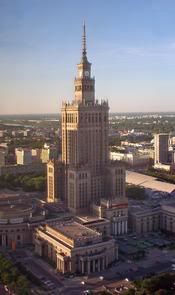Talking points
*The Polish-Belarus crisis shows no sign of abating, as ethnic Poles in Belarus who met with presidential candidate Donald Tusk have been thrown in jail. WBJ: Belarusian authorities toss Poles in jail for meeting with Donald Tusk
The repression of the Polish minority in Belarus further strengthened as the Belarusian authorities began to punish Poles who took part in a meeting with Donald Tusk, the Civic Platform candidate for the presidency, who visited Belarus on Monday. Tadeusz Gawin, one of the founders and the first president of the Association of Poles in Belarus, received a 15-day sentence yesterday. The deputy president of the Association, Wiesław Kiewlak, was also arrested but later released, while Andrzej Pisalnik, considered the spokesman of the Association, remained under arrest. "Gawin and Kiewlak are the first to answer for the participation in the Monday meeting with Tusk," said Belarusian journalist Vania Roman. "The police have two months to punish all those present there. And they will surely do it." The actions of the Belarusian authorities were condemned in a joint declaration issued yesterday by the UK on behalf of the EU. The declaration was ultimately signed by 38 countries and called on Belarus to change the "repressive policy towards its citizens and fulfill its obligations concerning the observance of human rights, including minority rights."
Belarussian diplomats working in Poland have sent their children back to Belarus due to anti-Lukashenko sentiment in Poland, and probably the fear of being seen as sympathetic to the Poles.
*Iran's hardline new president is being sworn in, just as the EU-Iran nuclear crisis comes to a head.
This is going to be interesting - I hope a deal can be reached. I too am skeptical, but would be satisfied if tough monitoring rules came as part of the deal. If no deal can be reached (which looks increasingly more likely), the chorus of "I told you so" from the right will be deafening. Still, it was right to try diplomacy first.
*Yesterday, Bush signed CAFTA. Now George, I almost believe you're the free-trader you say you are! Still, there's illegal steel tariffs, farming subsidies, and the government's opposition to the CNOOC-Unocal deal - which hasn't helped China-US relations.
- The Economist's take
*Though more needs to be done, the Clean Air Act is working, says the New York Times.
*Hate crimes against Muslims in London after last month's bombings have nearly septupled on the same period last year. Will London be the next Paris or Amsterdam?














3 Comments:
CNOOC has withdrawn its offer primarily due to much opposition in Congress.
The problem I have with the WTO and NAFTA and CAFTA is that they do not allow for a level playing field. I think that there should be recognition of the fact that other countries do not have our labor and environmental protections.
I am very saddened by the report of the increase of hate crimes against muslims in London. We could all do with a little more cultural education. I think that the more we understand how the other person thinks and why he thinks that way, the more tolerant of others we will become.
I'm all for better working conditions and environmental regulation in Central America - God knows they need it.
The question is: How do you achieve it?
Would you have waited until these reforms had been enacted before we freed up trade? We'll be waiting a long while. I would favor putting a 20 or 30 year sunset on the deal, by the end of which, reforms must be enacted, or the deal dies.
But that's not about ensuring a level playing field. That's about protecting the environment and human rights.
Try telling a Guatemalan that HIS COUNTRY has an economic advantage over the US - You'll get a face full of Churrasco. The US controls the World Bank, IMF, WTO - and 7 out of the 10 biggest companies (and all of the top four) are American. Central Americans are opposing CAFTA because they think it will give American countries an even tighter stranglehold on their economies.
An uneven playing field? Look at where you're standing.
The United Nations:
The documents included in this collection constitute primary sources about the most decisive external economic relationship of twentieth-century Central America. As they reveal, the presence of the United States is so pervasive that it constitutes one of the main keys to understanding the present economic and social evolution of the Central American countries-Costa Rica, El Salvador, Guatemala, Honduras and Nicaragua. In fact, the documents presented here give ample support to the conclusion that, for Central America, the twentieth is the American century.
Resources:
For CAFTA
Against CAFTA
The Economist, January 22, 2004:
Capitalism in the raw
Labour rights and free trade with the United States
EVERY weekday, Dora Amelia Ramos, a single mother, leaves her breeze-block home in a village south of San Salvador at 6am to go to her job at a maquila factory making clothes for export from imported cloth. Earning the minimum wage of just over $5 a day, she is perched on one of the lower rungs of the world economy. But she counts herself lucky to have a job at all. That is because she is a trade unionist.
...
In the United States CAFTA is controversial. Lobbyists for some textile and sugar producers oppose it. Their aim is to protect their own uncompetitive businesses. To do so, they will pick on labour rights.
The trade agreement requires countries to enforce their own labour laws, and to "strive to ensure" that those laws uphold international labour standards. For opponents, such as [Michigan's own] Sander Levin, the senior Democrat on the House of Representatives' Ways and Means Committee, this is far too weak. His committee will scrutinise the treaty, probably in early summer. He argues that labour laws in Central America are "way off the mark compared to international standards". The treaty will be "politically unsaleable to workers in the United States who have to compete with suppressed workers in other countries." Mr Levin threatens to throw out CAFTA unless "meaningful labour agreements" are added, by which he means fines and penalties for breaching agreed standards.
His fears are echoed by opponents in El Salvador. They claim an influx of new maquila jobs will lead to a further deterioration of working conditions. Ms Ramos says these are already bad. In her last job, at Confecciones Niños, a textile factory in a free-trade zone owned by a former general, she says she was often denied drinking water, bathroom visits and time-off to see a doctor. Her wages were paid late, and overtime not at all. She adds that when she tried to form a union, she was threatened with the sack and blacklisting. All of this breached the country's labour laws.
Ms Ramos's experience is far from unique, according to recent reports by Human Rights Watch, a New York-based group, and the National Labour Committee, in Washington, DC. Some Salvadoreans agree. There is "a total neglect of labour rights by the state here," says Carlos Aristides Jovel, a labour-court judge. The independent ombudsman for labour rights complains of a "lack of political will" to enforce them. Workers in maquila plants often lack contracts, say the critics.
Individual abuses may exist, says the government, but it disputes such general criticisms. Jorge Nieto, the minister of labour, brandishes a book-length certificate from the International Labour Organisation to prove that the country's labour laws do meet international standards. He disputes the ombudsman's claim that government labour inspectors are too few (there are 62, for a workforce of 2.6m) and too corrupt.
El Salvador is one of Central America's more modern economies. Conditions in poorer Guatemala and Honduras are probably worse. But the wider question at stake is how to remedy the abuses, where they exist. Better enforcement of national laws is important.
Supporters of CAFTA also argue that the trade accord will bring more investment and more jobs to Central America, driving unemployment down and wages up and thus encouraging bosses to treat their workers as assets rather than pawns. Is that what the opponents want to prevent?
-- Are you in bed with the sugar lobby, Chuck?
Maybe Sandy Levin is, as well as his brother, one of my heroes, the Senior Senator from Michigan, Carl Levin, who has also come out against CAFTA - sad days...
"This wasn't about free trade-against -protectionism," said Sen. Carl Levin, a Democrat who voted against CAFTA.
"But trade has to be expanded in the right way and CAFTA is exactly the wrong way. It doesn't protect the rights of workers overseas and it encourages a race to the bottom in wages."
THE VERY NEXT SENTENCE:
Michigan exported $35.6 billion in goods to the world in 2004, according to the U.S. Department of Commerce, but the CAFTA nations represented a small slice of that market -- about $125 million.
I have a calculator handy. That's 0.35% of all Michigan trade.
A race to the bottom in wages? Do you take that seriously Chuck?
Come on. This is a step in the right direction, isn't it?
Post a Comment
< Main